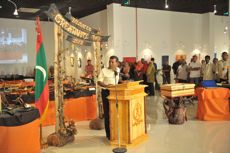Following a protest-packed weekend during which politicians were attacked and journalists threatened, the Foreign Ministry has requested a senior international legal delegation from the United Nations Human Rights Commission (OHCHR) to help resolve the current judicial crisis in the Maldives.
“We have been working to improve the judiciary since we came to power, but we have not succeeded. We have asked the international community to assist us in this effort several times, and we find that they are willing to help at this point,” said Foreign Minister Ahmed Naseem.
The request was made following conversations with UN officials last week. According to a press statement, the delegation would be asked to help resolve “the immediate issues surrounding the detention of Justice Abdulla Mohamed, the Chief Judge of the Criminal court, and also the longer-term problems facing the Maldives’ judiciary and the failure of judicial accountability mechanisms under the Constitution.”
Following the detention of minority opposition Dhivehi Quamee Party (DQP) leaders, who had accused the government of behind-the-scenes dealings with Israel and Christian priests, and the arrest of Judge Abdulla Mohamed by military forces after he attempted to block his own police summons in the High Court, opposition party members took the streets last week in protest. DQP meanwhile approached various foreign embassies claiming their freedom of speech was being impinged.
In a statement released on Friday the European Union (EU) Heads of Mission in Colombo expressed concern over the judge’s arrest and “[called] on all parties in the Maldives to act in accordance with these principles and to refrain from inflammatory language or other action which could incite hatred.”
In response the Foreign Ministry cited the government’s efforts to reform the judiciary and oppose the use of hate speech, reiterating its interest in continued relations with the EU.
Stating that “the diplomatic community has received inaccurate information” regarding the political situation in Male’, the Foreign Ministry said it had delivered “accurate information” to foreign missions last week. Officials say those missions had received the news positively, had asked that “racial rhetoric” be stopped, and had not expressed concerns over the judge’s arrest.
Observing that judicial reform “really should come from the Judicial Services Commission (JSC)”, Naseem said the commission’s shortcoming are “now an issue of national security.”
In its statement the Foreign Ministry contended that “since its establishment the JSC has been unable to fulfill [its] constitutional mandate. For example, during the whole of 2010 the JSC failed to take action on any of the 143 complaints submitted to it. On the one occasion in late 2011 when the JSC did find that a judge (Justice Abdulla Mohamed) had failed to comply with the required standard of conduct and had been acting in a manner amounting to gross misconduct, the Civil Court issues an order (26 November 2011) preventing the proceedings.
“With that order, the Civil Court effectively removed the constitutional powers of the JSC. The JSC was made powerless by the very same people (judges) that it is supposed to oversee.”
In communications with the OHCHR the Foreign Minister said the Civil Court’s action highlighted “a systemic failure of the judicial checks and balances foreseen in the Constitution. This systemic failure led directly to the President’s decision [to arrest the judge].”
Parliament’s Independent Institutions Committee has been tasked with investigating the JSC’s “failings”. According to committee member Independent MP Mohamed Nasheed, hearings and interviews have been concluded and possible reformation of the JSC has been discussed.
“It’s the one institution that has not really taken off. It’s been bogged down with personality issues and procedural issues. Bring in a change of membership, some new blood, and give it a new chance,” he said.
Nasheed added that a provision allows for the appointment of foreign judges during the first 15 years of the new Constitution. Naseem said the requested delegation did not necessarily fall under the provision, but rather was expected to provide guidance according to the local situation.
Specifics of the delegation are unknown as the request was only recently made, however Naseem explained that “the planning and appointment process takes time, as we need individuals qualified to stay here for a long period of time.”
“We hope that with the help of Islamic judges the Maldives judiciary would be improved”, he said.
While representatives from opposition Progressive Party of the Maldives (PPM) could not be reached at time of press, Mulak MP Abdulla Yameen yesterday said the President has no authority to “meddle with” or enforce the nation’s judicial system, local media reported.
Opposition Dhivehi Rayyithunge Party (DRP) MP Ibrahim ‘Mavota’ Shareef today said “DRP will welcome any international participation to solve the situation at the moment.”
Shareef asserted that the Constitution is not in crisis, “only that President Nasheed has violated it. We’re very sure that the international delegation would hold him accountable because there is no way that President Nasheed is justified in what he is doing.”
